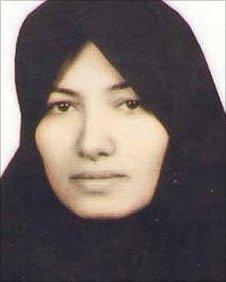Iran stoning 'temporarily halted' by judicial chief
- Published

Sakineh Mohammadi Ashtiani's case has drawn worldwide attention
Iran's judiciary chief has temporarily halted the stoning to death of a woman convicted of adultery, state news agency Irna has said.
Malek Ajdar Sharifi, the judiciary head in East Azerbaijan province, said the execution would still take place when Iran's judiciary chief decided.
The ruling against Sakineh Mohammadi Ashtiani, a 43-year-old mother of two, has sparked an international outcry.
Ashtiani has been jailed in the north-western city of Tabriz since 2005.
Rights groups have warned that she could still be hanged.
"The verdict has been halted due to humanitarian reservations and upon the order of the honourable judiciary chief [Sadeq Larijani] and it will not be carried out for the moment," Mr Ajdar Sharifi told Irna.
"Whenever the judiciary chief deems it expedient, the verdict will be carried out regardless of Western media propaganda," he said.
International outcry
On Friday, Iran's human rights commissioner Mohammad Javad Larijani said that Ashtiani's death sentence was "under review", noting that judges "rarely use" the penalty of stoning.
According to rights group Amnesty International, at least six people have been stoned to death in Iran since 2006; another 15 people were spared.
Mr Larijani did not say what penalty Ashtiani could face instead.
Last week, Ashtiani's lawyer and human rights activists warned that her execution by stoning was imminent, after all available appeals for clemency had been exhausted.
The United States, the European Union, Britain and international human rights groups have all appealed for a stay of execution.
In May 2006, Ashtiani was found guilty of having had an "illicit relationship" with two men following the death of her husband. She was given 99 lashes.
But that September, during the trial of a man accused of murdering her husband, another court re-opened the case based on events that took place before her husband died.
Despite retracting a confession that she said she had been forced to make under duress, Ms Ashtiani was found guilty of adultery - a major offence under Iranian law - and sentenced to death by stoning.
- Published9 July 2010
- Published9 July 2010